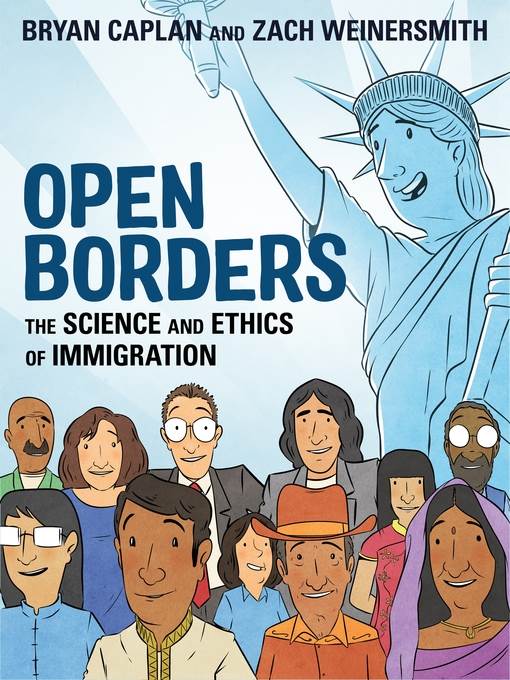
Open Borders
The Science and Ethics of Immigration
کتاب های مرتبط
- اطلاعات
- نقد و بررسی
- دیدگاه کاربران
نقد و بررسی

August 26, 2019
In Caplan’s concise and clarifying barn burner of an economics thesis, he declares: “I want to see two parties fight about who loves immigration more.” The George Mason University professor lays out his pro–open borders argument via wonky charts, data sets, and philosophical ruminations, brought to life by webcomics artist and science buff Weinersmith’s clean, cheerful, and colorful drawings. Avoiding the nonfiction comics trap of info dumps, the science and art interplay in often amusing sequences that pan out to the bigger picture from cited facts and analysis. When Caplan points out that immigrants repopulate small, rural towns that have turned into “zombie economies,” the image of a plague of zombies strolling a hollowed-out town center makes the idea stick. Both the arguments and visuals challenge toxic myths about immigrants—such as that they are responsible for increases in violent crime in the United States. “Whatever you’ve heard, the answer is no. On average, the foreign-born are less criminally inclined than natives,” Caplan says, coolly staring down a masked bandit in an American flag shirt. The combination of Caplan’s deep research and Weinersmith’s snappy storytelling adds up to a persuasive treatise that sees open policy around immigration as historically positive and a future potential rising tide of consumers and producers together lifting boats and bottom lines.

October 25, 2019
In advance of the 2020 U.S. presidential election, this latest from economist Caplan (The Case Against Education: Why the Education System Is a Waste of Time and Money) makes the case for open borders across the planet--and in particular into the United States. Joined by cartoonist Weinersmith (Soonish: Ten Emerging Technologies That'll Improve and/or Ruin Everything) and modeling his approach on Scott McCloud's seminal Understanding Comics, Caplan appears as a character in almost every panel, speaking directly to readers about the economic and humanitarian logic of doing away with immigration restrictions, all of which is supported by extensive endnotes. While conservative readers will appreciate his free-market perspective, they might be less persuaded by his contrarian arguments. Progressives on the other hand might cheer his conclusions but find his underlying libertarian assumptions--as well as Bush/Cheney notions of certain immigrants "hating freedom," the use of debunked studies comparing national IQs, and lack of attention to structural inequality, racism, and ecological limits--dubious and off-putting. VERDICT While seeking political middle ground, Caplan's rational but myopic arguments aren't likely to advance a debate currently steeped in xenophobic irrationality, especially as they avoid naming and addressing racism. Recommended for collections with well-balanced social justice perspectives on this timely issue.--Michael Dudley, Univ. of Winnipeg Lib., Man.
Copyright 2019 Library Journal, LLC Used with permission.

November 22, 2019
Gr 9 Up-Caplan, professor of economics at George Mason University, takes a heroic stab at parsing out the reigning schools of thought regarding immigration and makes an earnest case for open borders across the globe. Marrying historically long and convoluted political arguments with layers of statistics, charts, and graphs would be a risky move, but Caplan nevertheless creates a humorous graphic novel that unravels the immigration debate that rages on in the United States. Drawing on significant research and inserting himself into the narrative as a guide, Caplan patiently looks at all the perspectives of the issue: cultural, philosophical, moral, and, of course, economic. Most intriguing, he finds viable compromises between the two seemingly unmitigable sides. Caplan is unabashed in his push for unrestricted immigration, using his own expertise in economics as the backbone of his arguments. Weinersmith's cartoons follow the pace of the arguments effortlessly, sprinkling in hard data along with dynamic interpretations of Caplan's examples. The graphic quips keep things both entertaining and educational. While the author has a clear agenda, he is respectful in his depictions of the most common opposing arguments. VERDICT Highly recommended for all libraries' graphic novel collections and for teachers seeking alternatives to more didactic texts on immigration.-Michael Marie Jacobs, Darlington School, GA
Copyright 2019 School Library Journal, LLC Used with permission.

























دیدگاه کاربران